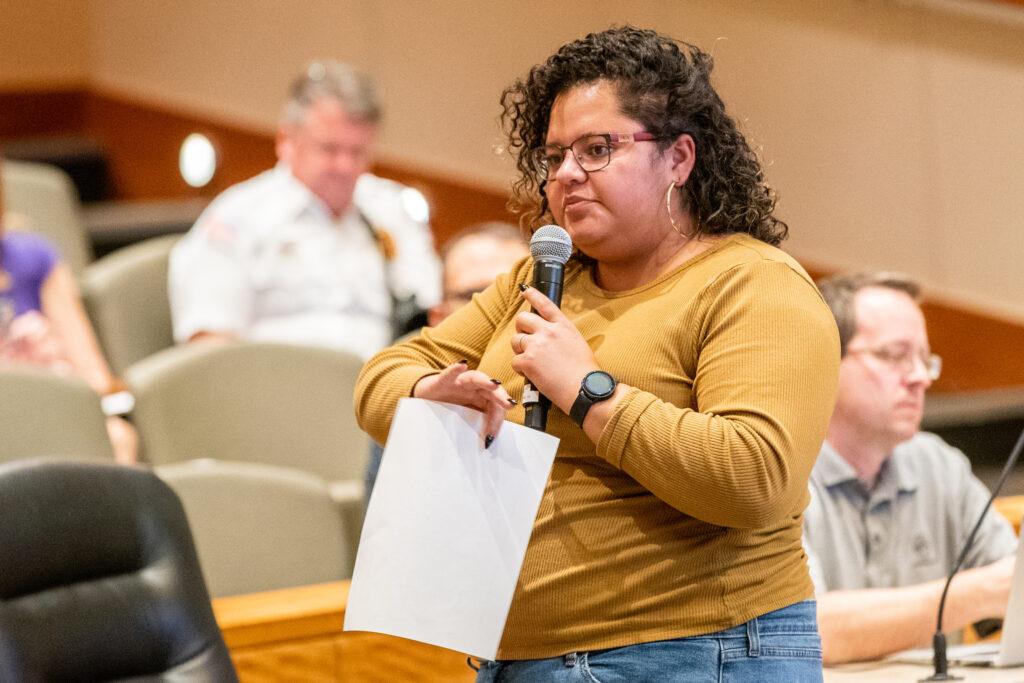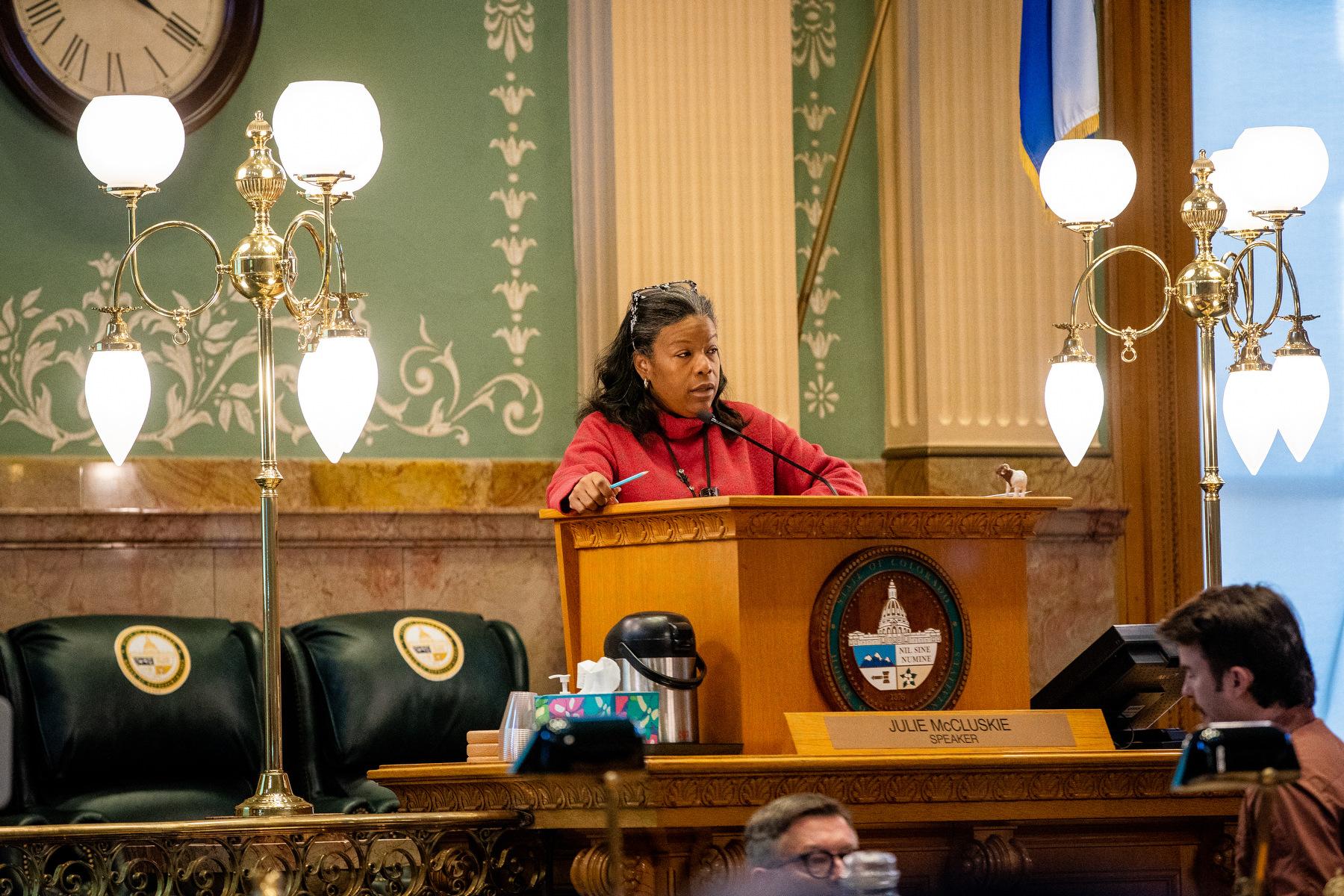
Aurora residents can see near real-time data on crime in their communities and police uses of force on a website the Police Department launched this month.
APD says the data that’s now available is a first step and will eventually be augmented. Its release is a milestone for a city that is under a first-of-its-kind agreement with the state attorney general, called a consent decree, to make policing more equitable and respectful of the community, including requirements that it improve transparency with the public.
The initial version of the data portal stops short of delivering a lot of the specific information that community and police reform advocates want to see, and its rollout has been slower than expected.
The new “Transparency and Accountability Portal” shows crime data as an aggregation, based on locations, time periods and types of crimes. It does not allow someone to zoom in to see details of specific incidents.
The portal includes data points for each instance where a police officer used force on members of the public, including the demographics of the officer and the subject involved, while omitting their names and other detailed information about the incident.
“We have been waiting for this transparency portal for quite some time,” said Maisha Fields, an Aurora resident and volunteer member of a community advisory council that has been enlisted to help bring about reforms at APD.
She believes that APD has lacked urgency in delivering the data portal, and she is “underwhelmed” by what’s available and the format in which it’s presented.
The portal has been in development since 2021 and was expected to launch before the end of 2023. It will display other types of data and information in the coming months and years, according to APD.
The public’s demand for more easily accessible information about police conduct is part of a broader reimagining of policing envisioned by communities, which was the subject of local and national protests in 2020.
Jeff Schlanger, the consent decree’s independent overseer, has been working with Aurora to put more value on transparency. He sees the launch of the portal as “a step on the evolution of transparency to the community.”
Transparency is fundamental to good, modern policing, said Schlanger, because if the community is not informed, “they can't be providing meaningful input into what they want their police department to be accomplishing and what they want their police department to look like.”
In addition to data on crime and uses of force by police, the portal currently has a page for demographics of the Aurora Police Department by age, gender, race, ethnicity, years of service and internal measures like rank within the department. APD Division Chief Chris Juul said that’s something the community has been asking about.
Juul said APD officers have realized that residents don’t know as much about the department and how it operates as employees had assumed.
Now, he said, “I think we recognize the importance of sharing the data we collect with the community.”
He sees the portal’s launch as part of the department’s efforts for “continuous improvement.”
Gianina Horton, who lives in Aurora, co-leads the Denver Justice Project and serves on the community council with Fields, said, “It definitely is phase one of a portal that needs more time and effort and intention when it comes to the data that the community is really interested in seeing.”

The transparency portal will evolve to show other data and information, and APD wants community input on what to include.
APD plans to add information about complaints or commendations related to interactions with police. Historically, data about complaints have been released in annual reports, but Schlanger said it should be made available on the portal closer to real-time.
Horton and Fields said being able to see that information, as well as commendations for police work, is crucial.
Fields believes that transparency about positive police interactions could help morale in the department, and on the flip side, “I should be able to put in an officer’s badge number and see if he’s been written up. It should be that easy,” she said.
Disciplinary actions for officers who violate policies; information about cold cases; and how the demographics of the community compare with data about arrests and uses of force are all areas the community council would like to see added to the portal, as part of the overarching goal of improving public safety.
Juul said the department already plans to add data about how many contacts with police are initiated by the public and how many are initiated by officers; and data about what comes out of contacts with officers, like whether people are arrested or given a summons or a ticket.
He wants to hear from residents about what other data they want to see on the new portal, and it has a link to offer feedback.
On the page showing demographics of the Police Department, Fields would like it to add information about how many officers live in Aurora or Arapahoe County, and the racial make-up of those officers. She also wants to know the demographics of people who started but did not make it through Police and Fire Department training, to see if that information supports claims that it’s difficult to recruit people of color into those roles.
“How can we close the gap to make sure that if they want to be a police officer, they're afforded that opportunity and it results in them working in the community that they grew up in and came from?,” Fields said. “Because that's the model of real, true community policing: That you live in the community, you know the people in your community, and you're not afraid of the people in your community.”
Accessibility of the data is another issue, according to Fields and Horton, who want to see the data presented in a way that’s more easily understandable than the initial launch.
“Aurora is so diverse with socioeconomics, with language, with overall class background,” Horton said. “We want people to be able to understand the numbers in a way that resonates with their lives, with their lived experiences.”
Fields suggested the department hold community forums where people are shown how to use the data portal and navigate the information that’s now available, and she intends to be part of that effort.
“I think the more data that we can present through this portal, the better off we'll be,” Schlanger said. “Really, nothing that government agencies do should be secret or kept from the public, except in very rare circumstances.”

The release of the portal does not alleviate all the concerns about data raised by the consent decree monitor.
In October 2023, Schlanger noted that Aurora was behind schedule in collecting and reporting out data about its interactions with the public.
The consent decree specifically instructs Aurora to track arrests and summonses issued for charges of failure to obey a lawful order, resisting arrest and criminal trespass; and to monitor misdemeanor arrest outcomes. The Attorney General’s office required these data points because the use of these charges could reveal practices of discriminatory policing.
Juul said APD is working on compiling that information, but hasn’t delivered it to the consent decree monitor or to the public. He said APD has always been good at data collection, but that, “We have not had mechanisms to use that data for self-improvement in the way that we are now.”
Schlanger said APD’s new transparency portal doesn’t address all of the deficiencies he identified, and that it was not meant to. He expects to release more details on their progress in April 2024, but for now, he said that some of the data collection concerns have been addressed or are being addressed, and he’s continuing to watch it closely.
The consent decree is entering a new phase: For more than a year, the focus has been on writing new policies around using force, among other things. Now, the independent overseer will test whether Aurora Police and Fire are putting those policies into practice in interactions with the community.
“The real question for the public is, ‘Okay, am I feeling this on the streets of Aurora?’ And that is what we will be testing,” Schlanger said.









